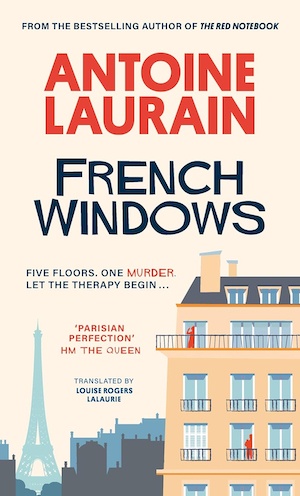
Translated by Louise Rogers Lalaurie — The unconventional short novel French Windows by French author Antoine Laurain proves once again that delving into another person’s psyche is tricky business. You know from the cover that the book is a murder mystery, but what is this murder? When and where does it occur? And when the event finally appears in the story, the victim and perpetrator are a surprise. What the book has been up to in reaching that point is a trip through the garden of a psychiatric patient’s mind.
In this story, Parisian psychiatrist Dr J Faber relates his encounters with a new patient, Nathalia Guitry, a beautiful young woman who is a successful photographer. But she’s stopped taking pictures. What does she want out of therapy, he wonders, as she seems unsure. He asks whether she remembers the last photograph she took, and she does. It was a murder. With this announcement of hers, he ends the session.
She returns for a second appointment and reveals that she spends her days mostly observing the people in the five storey block of flats opposite hers. Observing is what she’s good at, after all.
They have trouble starting their conversations, until he suggests she write down what she thinks she’s seeing – the stories of these other people’s lives. Her written words may be a window into the thoughts in her mind, he thinks. She agrees to do this, and the stories she writes are interesting and clever and become chapters in the book.
Many of the characters she writes about are creative (like her) in different fields or in different ways, and she writes their stories from their point of view, not her own. Rather than deliver the stories to Faber by hand, she mails them, because she doesn’t want to observe him reading her words. Faber begins to wonder how real the stories are, and she provides websites and even an invitation to a bookstore event to demonstrate the truth of the observations she’s reporting. He tries to apply the story or theme of these other people’s lives to Nathalia, but she resists such easy analysis.
I enjoyed both the stories of the residents in the flats opposite, like a succession of short stories, as well as Faber’s reactions and insights. Where a story about psychoanalysis might become somewhat tedious or depressing, author Laurain maintains a light touch that’s a pleasure to read. In the telling of Nathalia’s stories, Laurain captures many aspects of daily life in Paris, French people’s attitudes and preoccupations. It feels as if that apartment building has an entire world, with its residents’ friendships, regrets, ambitions and longings.
So we proceed upwards: from the ground-floor apartment of a life coach; to the first-floor apartment of a successful cartoonist, overweight all his life, who through diet and exercise has become svelte, he says; to a lyricist on the second floor with his cat named after the arch-devil Belphégor; and so on. Each interesting in his or her own way. But what about that murder?
You just have to wait for it to learn what motivated it, how it was done, and why it’s important and to anticipate the changes these revelations will make in the lives of those involved.
Antoine Laurain is the prize-winning author of several other books, translated into numerous languages, including best-sellers The President’s Hat (adapted for French television) and The Red Notebook. Camilla Parker Bowles included his romantic tale The Red Notebook on a list of nine books she recommended people read during lockdown.
Also see The Psychologist’s Shadow by Laury A Egan or This is How We End Things by RJ Jacobs.
Gallic Books
Print/Kindle
£8.99
CFL Rating: 4 Stars